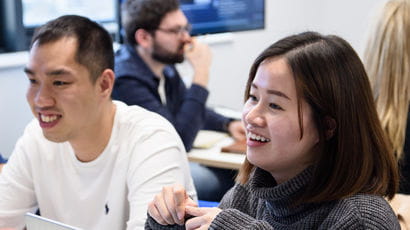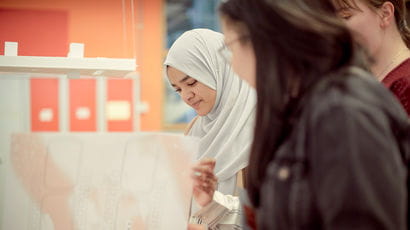South, West and Wales Doctoral Training Partnership – student-led PhD opportunities
Fully-funded Arts and Humanities Research Council (AHRC) funded PhD studentships as part of the South, West and Wales Doctoral Training Partnership (SWW2).
Introduction
We are delighted to announce the availability of fully-funded Arts and Humanities Research Council (AHRC) funded PhD studentships as part of the South, West and Wales Doctoral Training Partnership (SWW2).
- The closing date for applications is 23:59 on Monday 25 January 2021.
- The start date of this PhD studentship is Friday 1 October 2021.
Studentship details
UWE Bristol invites applications to undertake doctoral research that focuses on any area of digital culture, film and media, design, heritage and the creative economy. All applicants should identify a supervisor with relevant expertise in the area of their proposal - please select 'UWE' to find UWE Bristol supervisors. Please note, the list of potential supervisors in this database is not exhaustive. Any UWE academic in one of these subject areas may be eligible.
View an overview of research in the School of Creative and Cultural Industries and for the School of Art and Design.
As well as welcoming proposals relating to individual supervisors' specialist expertise, we also encourage applications which relate to research within the above subject areas of one of the following four research centres: Centre for Fine Print Research (CFPR) the Digital Cultures Research Centre (DCRC), Regional History Centre (RHC) and Bristol Centre for Linguistics (BCL). Each research centre has a track record of supervising interdisciplinary research projects and, in particular, practice-led research.
Centre for Fine Print Research
Since its establishment in 1998, the world-leading research undertaken at the CFPR has evolved from a deeply rooted understanding of historical 19th century photomechanical printing and traditional print materials, tools, process and applications, to the development and exploitation of methods that combine traditional and digital technologies using a wide range of materials. Incorporating 2, 2.5 and 3 dimensions, we undertake applied research providing innovative solutions to real-world needs.
The Centre's strengths are embedded in the crossovers between craft and technology, science and engineering. The three overarching themes are:
- industry and transformative technologies for practice-led design
- cultural heritage, reconstruction and reproduction
- physical surface, novel materials and tactile printing.
Our team of researchers, designers and artists share a deep appreciation and knowledge of materials and making, and based on our design and craft skills, know-how and application, and can translate idea and communicate methodologies across many disciplines. Through art and design training, we are creative problem solvers - challenging assumptions and bridging the gap between art and technology.
For further information, please contact Professor Carinna Parraman, CFPR Director, at Carinna.Parraman@uwe.ac.uk.
The Digital Cultures Research Centre (DCRC)
The Digital Cultures Research Centre is a leading hub for interdisciplinary theoretical and practice-led research in a digital age. In a context of transforming media cultures, our work seeks to interrogate, articulate, intervene in and create practical approaches to responsible technological futures. Based in the internationally renowned Pervasive Media Studio in Watershed Media Centre on Bristol's Harbourside, we undertake our work in dialogue with a network of award-winning practitioners.
The unique character of the DCRC is our mix of criticality, creativity and application. Our researchers:
- conduct theoretical, practice-based, and collaborative research into emerging media forms, technologies, industries and practices
- map and contextualise emerging digital practices, critically reflecting on their aesthetics, ethics and impacts
- create new knowledge about creative media applications in real world contexts, and about everyday life in today's digital media ecology
- rethink the idea of cultural value and develop new creative economy models and resilient cultural ecologies.
Research interests within DCRC include: emerging documentary forms; immersive media and experience design; ambient literature; techno-civic interfaces and urban interventions; interactive heritage design; cultures of repair and re-use; automation, data and AI; creative clusters, networks and policies; cultural histories; media industries; film and television studies.
Our researchers collaborate with national and international academic and industry partners and with a broad range of community, cultural and third sector organisations. The DCRC also hosts the South West Creative Technology Network (SWCTN), a £6.5 million project to expand the use of creative technologies across the region, funded by Research England. This new network is developing collaborative research on immersion, automation and data, and is led by the University of the West of England (UWE Bristol), in partnership with Watershed in Bristol, Kaleider in Exeter, Bath Spa University, the University of Plymouth and Falmouth University.
For further information about research in these areas, please contact Mandy Rose, DCRC Director, at Mandy.Rose@uwe.ac.uk.
Regional History Centre (RHC)
The Regional History Centre offers supervision on any historical topic for which a South West regional case study would be appropriate. The Centre has an excellent track record of research, publication and active intervention in this area, and has established active and mutually beneficial partnerships with a large number of external institutions and cultural organisations, including Bristol Culture, the public body responsible for the city's museums, galleries and archives. We have particular strengths in:
- museology, co-production and community partnerships
- immersive digital media for heritage
- environmental and place-centred histories
- history and heritage from below
- law, order and social movements
- war and memory.
View more information on the Bristol Regional History Centre.
Bristol Centre for Linguistics (BCL)
Bristol Centre for Linguistics welcomes PhD students in semantics, pragmatics, psycholinguistics, sociolinguistics, multimodal analysis and language acquisition. Researchers in the Centre are currently engaged on work on parliamentary discourse, British sign language, bilingualism in the Bristol Somali Community and the status and acquisition of discourse markers, fillers and filled pauses.
You can see potential supervisors' areas of interest and areas covered by current and recently graduated postgraduate research students via members of the Bristol Centre for Linguistics.
Eligibility
Studentships will start on Friday 1 October 2021 and consist of an annual tax-free stipend of £15,285 (20/21 rates to be confirmed). In addition, full-time tuition fees will be covered for the length of the funding period. Please see the South, West and Wales Doctoral Training Partnership Student-led Awards for further details.
The full award only covers the UK rate tuition fees, so UWE Bristol will cover the difference between the UK rate and the international fees for successful UWE Bristol international candidates.
Please see the South, West and Wales Doctoral Training Partnership eligibility and residency guidelines.
How to apply
The closing date for applications is Monday 25 January 2021. Applicants need to apply to both SWW2 for funding and to UWE Bristol for a PhD place.
Apply for SWW DTP2 funding
Please find full details and guidance on the SWW2 page for prospective students, and apply via the SWW2 application system by the closing date.
Apply for a PhD place at UWE Bristol
Please apply via the UWE Bristol online application and quote reference 2021-OCT-ACE03.
You may also be interested in

Contact the Doctoral Academy
Ways to contact the Doctoral Academy, from postgraduate research support to submitting your thesis.

Fees and funding
View Doctoral Academy tuition fees, project fees, completion fees and resubmission fees.

About the Doctoral Academy
Find out more about the UWE Bristol Doctoral Academy.

Research
Discover how research at UWE Bristol is making a real impact.
